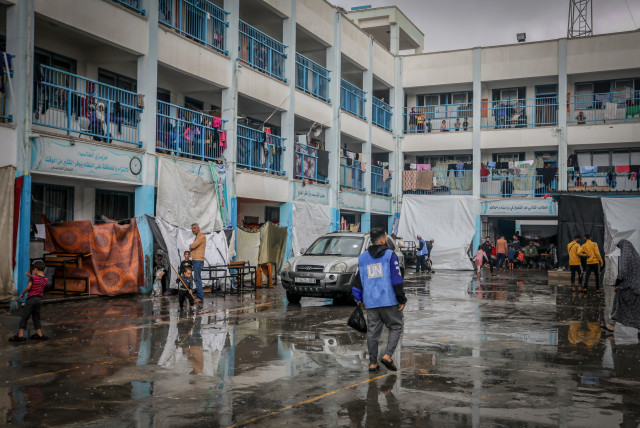IDF Chief to Comptroller: Back off from concurrent war probe

UNRWA accuses Israel of illegal strike; IDF discloses tactics for blocking Palestinians’ return to north
IDF Chief of Staff Herzi Halevi on Wednesday rejected State Comptroller Matanyahu Englman’s request to turn over internal military documents for a probe into the state’s failures that enabled Oct. 7. Englman made the request earlier this month.
Halevi noted that although the military was undertaking its probe independently and the IDF was supportive of a postwar state commission of inquiry, distracting the IDF mid-war with comptroller inquiries would be dangerous.He said there was “no precedent for undertaking this kind of probe” mid-war, such that all parallel probes took place only after the fighting stalled.Halevi added that such a probe would “distract commanders and harm the ability and quality of the IDF’s ongoing operational probe. It would also prevent implementing the lessons necessary to achieve war goals.” Halevi recommended that Englman delay the probe until a later date.The comptroller had not rushed to go public on the issue but after his requests for information to perform his probe were submitted to the IDF, the Mossad, the Shin Bet (Israel Security Agency), and the National Security Council and then publicized, he was attacked for politicizing the process.In response, he defended his probe as professional and non-partisan. Englman said that the war is so long and that aspects of it have slowed down enough so that the investigation into the failures of Oct. 7 could no longer be delayed; they have already waited months.
ACROSS THE BORDER, in Khan Yunis in the southern Gaza Strip, tank shells hit a UN training center that had been sheltering tens of thousands of displaced Palestinians. Footage circulating among Palestinians showed black smoke pouring into the sky above the training center, which is run by UNRWA, the UN relief organization for the Palestinians. A UNRWA team trying to reach the center was blocked, the organization’s director of Gaza affairs, Thomas White, told Reuters.
The IDF said the wider area was a significant base for Hamas terrorists. “Dismantling Hamas’s military framework in western Khan Yunis is the heart of the logic behind the operation,” the army said.The US is concerned about the attack, Deputy State Department spokesperson Vedant Patel said, repeating Washington’s calls for the protection of civilians, humanitarian workers, and aid facilities. “We deplore today’s attack on the UN’s Khan Yunis training center,” Patel told a news briefing, calling it “incredibly concerning.”The IDF has documented at least dozens of incidents in which Hamas used hospitals, UN facilities, schools, and other sensitive sites to either stage attacks or store weaponry.Responses from the UN
The director of UNRWA Affairs in Gaza said that nine Palestinians were killed and 75 were injured when two tank rounds hit the building that was sheltering around 800 people. The IDF earlier ordered the evacuation of the area, which the UN humanitarian office said held half a million people, with four-fifths of them displaced by fighting in other parts of the coastal strip.

Is it safe to return home yet?
Hamas has been trying to pressure Palestinians to return to northern Gaza without surrendering or returning the approximately 130 hostages it is still holding. When a group of approximately 30 civilians, including children, gathered to begin moving toward the crossover point near the Gaza River, the IDF fired white smoke to discourage them from approaching.
This usually works, but if they continue to approach, then the IDF will shoot live-fire warning shots in the air and on the ground nearby to deter them. There have been a very small number of civilians who have continued past this point, so it has been easy to arrest them and then send them back south.In contrast, if someone presenting a danger approaches the crossover point, IDF soldiers are authorized, after trying warning shots, to also fire at the person’s legs.To date, Brigade 646, which has been involved in this effort, has been successful in preventing Palestinians from returning, as the IDF blocked Hamas from trying to reestablish itself more generally in central or northern Gaza.Last week, the same brigade bombed key points that Hamas used in tunnels to get past Wadi Ghaza. Working with the Yahalom unit, they destroyed the tunnel network, which was located one and a half kilometers from the border. It was one kilometer long and reached a depth of 20 meters.While destroying the tunnel, troops also found and seized Hamas rockets, including some platforms hidden in the ground or bushes.Elsewhere in Khan Yunis, forces from the 98th Division continued their encirclement of Hamas terrorists, killing several terror cells. Multiple armed groups of terrorists attempted ambushes, including with anti-tank missiles, but were taken out in aerial strikes.The IDF considers western Khan Yunis the heart of Hamas’s operations, including areas where its top two leaders, Yahya Sinwar and Muhammad Deif, grew up.IN THE NORTH, the IDF hit Hezbollah targets in southern Lebanon, including the village of Yaroun, Hezbollah military locations, and terror infrastructure.
The military also said it struck other areas in southern Lebanon to eliminate threats.There were no rockets from Hamas for the third consecutive day, only three rocket sirens in the North, and the average number of rocket sirens for the week dropped to single digits.Jerusalem Post Staff and Reuters contributed to this report.
